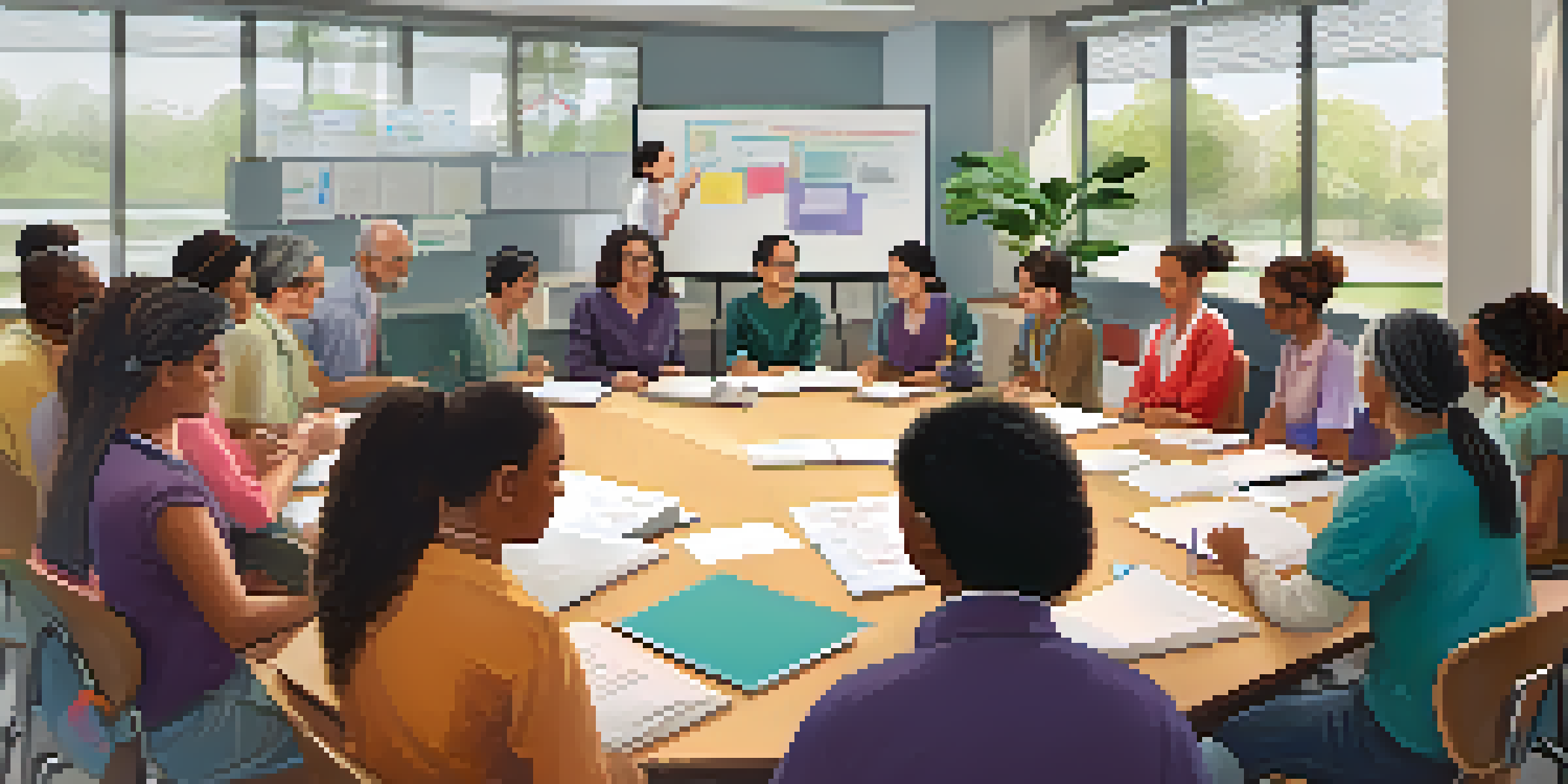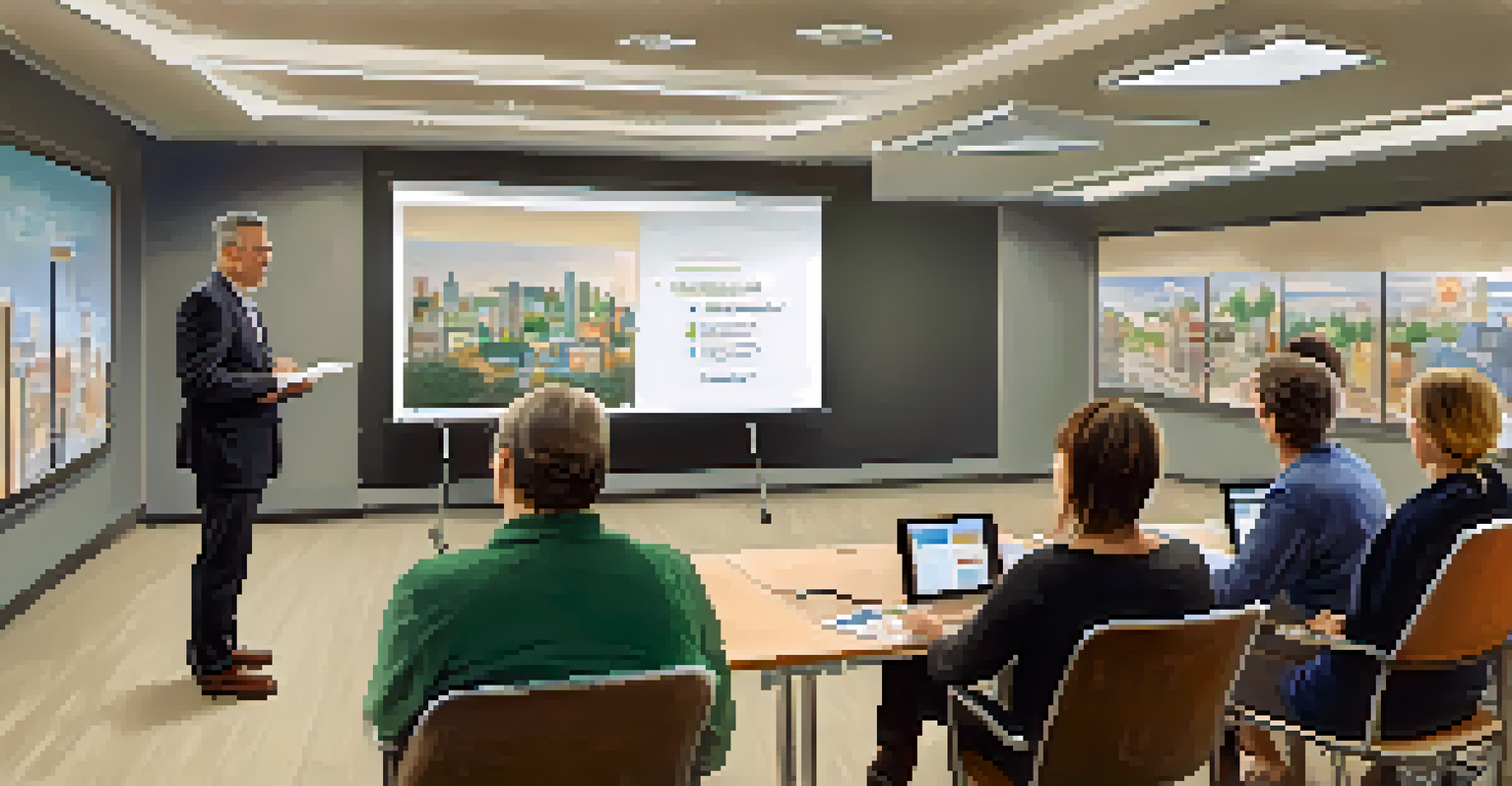The Role of Authentic Learning in Adult Education

Understanding Authentic Learning in Adult Education
Authentic learning is an educational approach that emphasizes real-world relevance and practical application. In adult education, this means connecting learning to everyday experiences and professional contexts. By fostering a learning environment that mirrors real-life situations, adults can see the value of their education immediately, making it more impactful.
Learning is not the product of teaching. Learning is the product of the activity of learners.
This approach encourages learners to engage in problem-solving and critical thinking, skills that are essential in the workplace. For example, instead of just learning theory, adults might work on projects that solve actual issues within their jobs. This hands-on experience not only deepens understanding but also boosts confidence in applying new knowledge.
Furthermore, authentic learning promotes collaboration among learners, which is crucial in adult education. Adults often bring diverse backgrounds and experiences, enriching the learning environment. When they collaborate on real-life projects, they learn from each other, enhancing their skills and perspectives.
The Benefits of Real-World Contexts in Learning
Incorporating real-world contexts into adult education helps learners relate concepts to their own lives. This connection boosts motivation, as students can see how what they learn applies directly to their work or personal challenges. For instance, a marketing course that uses current case studies can make strategies more relatable and easier to grasp.

Additionally, real-world scenarios encourage learners to think critically and creatively. When faced with practical problems, they must analyze situations, consider various solutions, and make informed decisions. This not only enhances their problem-solving skills but also prepares them for future challenges they may encounter in their careers.
Authentic Learning Connects to Life
This approach enhances adult education by linking learning to real-world experiences, making education more relevant and impactful.
Moreover, real-world contexts facilitate retention of knowledge. Adults are more likely to remember information that is relevant to their lives. When they can associate a lesson with a past experience or a current situation, it becomes easier to recall and apply in the future.
Engagement Through Collaborative Learning Experiences
Collaboration is a key element of authentic learning that significantly enhances adult education. By working together, learners can share insights, challenge each other's ideas, and develop a deeper understanding of the material. This social interaction not only fosters a sense of community but also simulates workplace dynamics, making the learning experience more relevant.
Tell me and I forget, teach me and I remember, involve me and I learn.
For example, in a group project, one adult learner might excel at research while another shines in presentation skills. By leveraging each other's strengths, they not only complete the task more effectively but also learn from one another. This peer-to-peer learning can be incredibly enriching, providing diverse perspectives on the same topic.
Furthermore, collaborative learning encourages accountability. When adults know their peers depend on them, they're more likely to engage and contribute actively. This sense of responsibility can lead to improved attendance and participation, creating a more vibrant learning atmosphere.
Facilitating Reflection for Deeper Learning
Reflection is a crucial component of authentic learning that helps adults process their experiences. After completing a project or activity, taking time to reflect allows learners to assess what they’ve learned and how they can apply it moving forward. This introspection can lead to significant insights and personal growth.
For instance, an adult learner might realize that a particular approach to problem-solving worked well in a group setting but could be improved in solo tasks. By reflecting on these experiences, they can adapt their strategies for future situations. This cycle of action and reflection enhances the overall learning process.
Collaboration Enhances Learning
Working together in diverse teams boosts engagement, accountability, and allows learners to benefit from each other's strengths.
Additionally, reflection fosters critical thinking. When learners evaluate their actions and outcomes, they develop a more nuanced understanding of the subject matter. This deeper engagement can lead to better retention of knowledge and the ability to apply what they've learned in various contexts.
Real-World Assessments: Measuring Authentic Learning
Assessing learning through real-world tasks is essential for measuring the effectiveness of authentic learning. Traditional tests may not adequately reflect a learner's ability to apply knowledge in practical situations. Instead, assessments that mimic real-life challenges can provide a clearer picture of a learner's capabilities.
For example, instead of a written exam, a business course might require learners to develop a marketing plan for a local company. This type of assessment not only evaluates their understanding of the material but also their ability to implement it in a real-world scenario. This hands-on approach often leads to more meaningful feedback.
Moreover, authentic assessments encourage continuous improvement. When adults receive constructive feedback on practical tasks, they can refine their skills and apply suggestions in future work. This ongoing process of learning and assessment aligns perfectly with the goals of adult education.
Fostering Lifelong Learning Through Authentic Experiences
One of the most significant impacts of authentic learning in adult education is its role in fostering lifelong learning. By engaging in real-world experiences, adults develop a mindset that values continuous improvement and learning. This approach encourages them to seek out new knowledge and skills long after formal education ends.
For instance, a learner who successfully applies new skills in their job may feel empowered to pursue additional training or certifications. This desire for growth can lead to a more fulfilling career and personal life. When education is tied to real-life applications, the motivation to learn extends beyond the classroom.
Reflection Drives Deeper Understanding
Taking time to reflect on experiences helps adults solidify their learning and adapt strategies for future challenges.
Additionally, authentic learning experiences help adults adapt to changing environments. In today’s fast-paced world, the ability to learn and adapt is crucial. By embracing a culture of lifelong learning, adults are better equipped to navigate the challenges and opportunities they encounter in their careers and personal lives.
Challenges and Solutions in Implementing Authentic Learning
While the benefits of authentic learning in adult education are clear, there are challenges in implementing this approach. One major hurdle is the potential lack of resources, as real-world projects often require time, materials, and sometimes external partnerships. Educators need to be resourceful in finding ways to integrate authentic experiences without overwhelming learners or themselves.
Another challenge is varying levels of comfort among adult learners. Some may feel hesitant to engage in collaborative projects or real-world tasks due to fear of failure or lack of experience. Creating a supportive learning environment that encourages risk-taking and values diverse contributions can help ease these concerns.

Finally, ongoing assessment of authentic learning experiences is essential. Educators should regularly evaluate the effectiveness of their methods and be open to feedback from learners. This iterative process allows for continuous improvement, ensuring that authentic learning remains relevant and impactful for adult students.